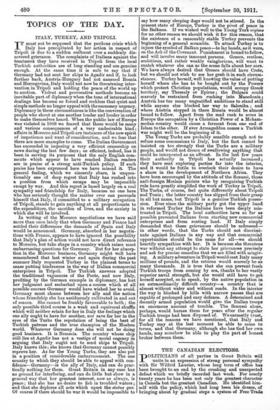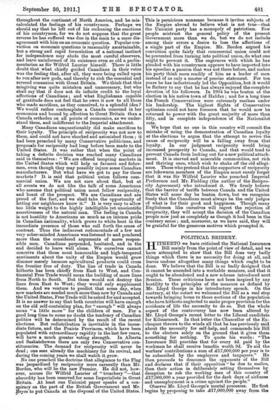THE CANADIAN ELECTIONS.
POLITICIANS of all parties in Great Britain will unite in an expression of strong personal sympathy with Sir Wilfrid Laurier, whose long term of office has been brought to an end by the crushing and unexpected defeat which we briefly recorded last week. For nearly twenty years he has been not only the greatest character in Canada but the greatest Canadian. He identified him- self with the policy, which had long been his dream, of bringing about by gradual steps a system of Free Trade throughout the continent of North America, and he mis- calculated the feelings of his countrymen. Perhaps we should say that he left out of his reckoning the emotions of his countrymen, for we do not suppose that the great reverse he has suffered was due in the main to a mere dis- agreement with him on an economic question. Popular con- viction on economic questions is reasonably ascertainable, but a strong and rapid formulation of a national instinct for independence may elude the most careful observers, and leave uninformed of its existence even so old a parlia- mentarian as Sir Wilfrid Laurier himself. There is little doubt that what chiefly guided. Canadians in their votes was the feeling that, after all, they were being called upon to run after new gods, and thereby to risk the essential and revered connexion with Great Britain. We think that this misgiving was quite, mistaken and unnecessary, but who shall say that it does not do infinite credit to the loyal affections of Canadians ; and what Englishman capable of gratitude does not feel that he owes it now to all those who made sacrifices, as they conceived, to a splendid idea ? We would rather contemplate a Canada unsound in her economics and bound bx affection to Great Britain than a Canada orthodox on all points of economics, as we under- stand them, and indifferent to the Imperial attachment.
Many Canadians unquestionably did. make sacrifices to their loyalty. The principle of reciprocity was not new to them, and could not have shocked and astonished them ; it had been preached by many Conservative politicians, and proposals for reciprocity had long before been made to the United States. It was rather that when the point of taking a definite decision was reached many Canadians said to themselves : " We are offered tempting markets in the United States which will help us farmers and fisher- men, even though they may possibly injure some Canadian manufacturers. But what have we got to pay for these markets ? It is said that political union follows com- mercial union. We are not sure about that, but at all events we do not like the talk of some Americans who assume that political union must follow reciprocity, and boast of the prospect. We are Canadians and are proud of the fact, and we shall take the opportunity of letting our neighbours know it." It is very easy to allow too little weight to the highly intelligible yet unscientific assertiveness of the natural man. The feeling in Canada is not hostility to Americans so much as an intense pride in Canadian nationality, which grows to white heat in the immediate presence of those who call forth the sense of contrast. Thus the indiscreet rodomontade of a few not very sober-minded Americans was listened to and pondered more than the considered arguments of more respon- sible men. Canadians perpended, hesitated, and in the end. decided to leave well alone. We ourselves cannot conceive that these most honourable and high-tempered sentiments about the unity of the Empire would grow dimmer merely because agricultural products could cross the frontier free of duty. The line of trade in Canada hitherto has been chiefly from East to West, and Con- tinental Free Trade would mean the building of more lines from North to South. But these would not destroy the lines from East to West; they would only supplement them. And we venture to predict that some day, when new markets are needed much more than now by Canada and the United States, Free Trade will be asked for and accepted. It is no answer to say that both countries will have enough on the old self-containing plan, for " enough " will always mean " a little more " for the children of men. For a good long time to come no doubt the tendency of Canadian politics will be determined by the result of the recent elections. But redistribution is inevitable in the imme- diate future, and the Prairie Provinces, which have been populated with extraordinary rapidity in the last few years, will have a much greater voting strength. In Alberta and Saskatchewan there are only two Conservative con- stituencies. The demand. for reciprocity will never be dead ; one sees already the machinery for its revival, and during the coming years we shall watch it grow. . No one preached the doctrine that allegiance to the Flag was jeopardized by reciprocity more earnestly than Mr. Borden, who will be the new Premier. He did. not, how- ever, accuse Sir Wilfrid. Laurier of " treachery "—that absurdity has been reserved for some Imperialists in Great Britain. At least one Unionist paper speaks of a con- spiracy on the part of the British Government and hfr. Bryce to put Canada' at the disposal of the United States. This is pernicious nonsense because it invites subjects of the Empire abroad to believe what is not true—that the Unionist party has a monopoly of patriotism. Few people mistrust the general policy of the present Government more than we do, but we do not include among their errors a desire to lose the affections of a single part of the Empire. Mr. Borden argued his conviction quite fairly that commercial union could not be prevented from turning into political union, do what one might to prevent it. The eagerness with which he has pleaded with his countrymen appears to have imported into his speeches a passion that was not there before, and makes his party think more readily of him as a leader of men instead of as only a master of precise statement. For ten years he has industriously led the Opposition, but it would. be flattery to say that he has always enjoyed the complete devotion of his followers. In 1904 he was beaten at the election in his native town of Halifax ; and for a long time the French Conservatives were extremely restless under his leadership. The highest flights of Conservative optimism could not have foreseen that he would now be returned to power with the great majority of more than fifty, and in complete independence of the Nationalist vote.
We hope that no one in this country will commit the mistake of using the demonstration of Canadian loyalty at the elections to argue that the attempt to revive the cause of reciprocity will be a falling away from that loyalty. In our judgment reciprocity would bring increased prosperity to Canada, and that would tend to prevent Canada from looking out for a new political attach- ment. It is starved and miserable communities, not rich and thriving ones, which wish to shake off the old allegi- ance. Those who pretend that the supporters of reciprocity are lukewarm members of the Empire must surely forget that it was Sir Wilfrid Laurier who preached Imperial Preference and Mr. Fielding (the author of the Recipro- city Agreement) who introduced it. We firmly believe that the barrier of tariffs between Canada and the United States will some day be beaten down, but we recognize freely that the Canadians must always be the only judges of what is for their good. and happiness. Though many Englishmen like ourselves will regret the rejection of reciprocity, they will accept the decision of the Canadian people now just as completely as though it had been in the contrary sense ; and, moreover, as we have said, they will be grateful for the generous motives which prompted it.











































 Previous page
Previous page